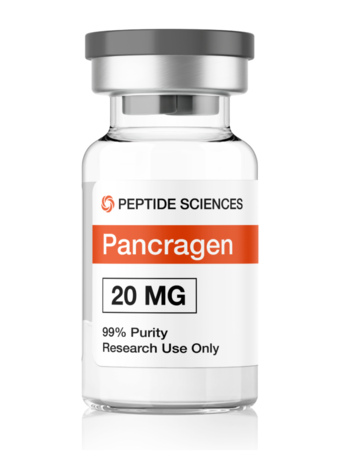Pankragen — natural tetrapeptide bioregulator, you can buy it in our online store, it has a primary effect on the pancreas. Pancragen studies have shown that it helps control blood sugar, improves endocrine function of the pancreas, regulates melatonin expression, and reduces the frequency and severity of metabolic syndrome. It has been studied and is of interest for the treatment of both diabetes and the metabolic consequences of aging. Pankragen can be considered as an anti-aging peptide for the pancreas.
Pankragen
Pankragen is a natural tetrapeptide bioregulator, which, as the name suggests, has a primary effect on the pancreas. Not to be confused with the DNA-based PancraGEN test. Pancragen has been shown to help control blood sugar, improve pancreatic endocrine function, regulate melatonin expression, and reduce the frequency and severity of metabolic syndrome. It has been studied and is of interest for the treatment of both diabetes and the metabolic consequences of aging. To some extent, Pancragen can be considered as an anti-aging peptide for the pancreas.
Pankragen and aging
Studies of pancreatic cells show that Pankragen stimulates the expression of a number of differentiation factors that control the growth of acinar and islet cells of Langerhans. The latter are responsible for insulin and glucagon. Although this may not seem like an antiaging effect, it should be clear that the restoration of improved growth and differentiation is a feature of young, healthy tissues. Improvement of these parameters, especially in old tissues, is a fundamental antiaging effect. Additional reasons for its classification as an antiaging peptide will be revealed in the remaining sections on Pancragen. In particular, its ability to alter the epigenetic regulation of DNA to improve gene expression is one of the most striking indications that
Pancragen can turn back time to promote DNA functioning more appropriate to youth.
Pankragen and metabolic disorders
Additional confirmation of the idea that Pankragen is an antiaging peptide is its effect on metabolic disorders. Studies show that metabolic dysregulation in the elderly is, at least partially, caused by changes in melatonin secretion during sleep. This melatonin deficiency is apparently caused by changes in insulin levels, which suggests that loss of insulin function, both in disease and as a result of old age, may be responsible for changes in melatonin secretion, which is then responsible for some other symptoms. metabolic syndrome
Based on the above, it is clear that the introduction of Pancragen, which helps to normalize insulin secretion, can further reduce the symptoms of metabolic syndrome due to the normalization of melatonin secretion. In fact, this is exactly what the studies show. The introduction of Pankragen reduces the level of glucose, but also reduces the concentration of insulin in the plasma, as well as the index of insulin resistance, which is convincing evidence that Pankragen has a direct effect on the transmission of melatonin signals
Both exogenous and endogenous melatonin inhibits pathophysiological mechanisms of metabolic syndrome and normalizes metabolism. Studies show that melatonin receptors exist in the pancreas, where they serve to modulate the transmission of insulin and glucagon signals in a 24-hour (daylight-sensitive) mode. There are many new studies devoted to how disorders of melatonin signaling are associated with the development of type 2 diabetes and metabolic syndrome.
If melatonin affects the pancreas, it is likely that there is a feedback mechanism by which glucagon and insulin signal the pineal gland to increase or decrease the release of melatonin.
In fact, this feedback loop also exists in type 2 diabetes, apparently responsible for additional metabolic effects that occur in this version of the disease, which are less common in type 1 diabetes. This could explain why Pankragen's ability to regulate insulin secretion by the pancreas also has a beneficial effect on other symptoms of metabolic syndrome.
Pankragen and vascular system
One of the most serious consequences of diabetes is the impairment of the function of small blood vessels, called capillaries.
Elevated glucose levels lead to the fact that these capillaries first become leaky, and then die, because the cells that make up them, called endothelial cells, become dysfunctional and then die. Many long-term consequences of diabetes, such as heart disease, kidney disease, erectile dysfunction, and limb loss, are the result of capillary damage and loss.




There are currently no reviews for this product.
Your review will be the first.
Tell other users of the site about the advantages and features of the product, share your impressions and expert opinion.